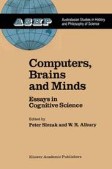Search
Search Results
-
Owning One’s Mind
Like Socrates, but for different reasons, Freud thought the road to wisdom travels by way of self-knowledge. Psychoanalytic therapy works, he held in...
-
Hussearle's Representationalism and the “hypothesis of the Background”
John Searle's “hypothesis of the Background” seems to conflict with his initial representationalism according to which each Intentional state...
-

-
Content: Covariation, control and contingency
The Representational Theory of the Mind allows for psychological explanations couched in terms of the contents of propositional attitudes....
-
More qualia trouble for functionalism: The Smythies TV-hood analogy
It is the purpose of this article to explicate the logical implications of a television analogy for perception, first suggested by John R. Smythies...
-
Chapter VIII
Most of us have from childhood had strongly realistic intuitions in the sense that we believe the physical world to exist independently of whether or...
-
Cognitive Inquiry and the Philosophy of Mind
Artificial intelligence deals with the most concrete and modern of artifacts, digital computers, and at the same time raises abstract and...
-
Belief and Responsibility
Few would deny that folk psychology embodies some essential components of our view of ourselves as persons. The specific element of personhood that...
-
Pragmatism, Phenomenology, and the Psychological Sciences
What are the prospects of reconciling analytic and Continental theories of the psychological sciences?
-
Syntactic Semantics: Foundations of Computational Natural-Language Understanding
In this essay, I consider how it is possible to understand natural language and whether a computer could do so. Briefly, my argument will be that...
-
The Paradox of Naming
There is overwhelming evidence that proper names must have senses or connotations that somehow contain contingent information about their referents....
-
Analytical Philosophy in Comparative Perspective: An Introduction
The aim of this volume is to extend the horizon of philosophical analysis as it is practiced today. If two different streams of philosophical ideas...
-
Armstrong’s Causal Theory of Mind
David Armstrong’s writings about the mind constitute a corpus of exceptional importance. Best known among these writings is his...
